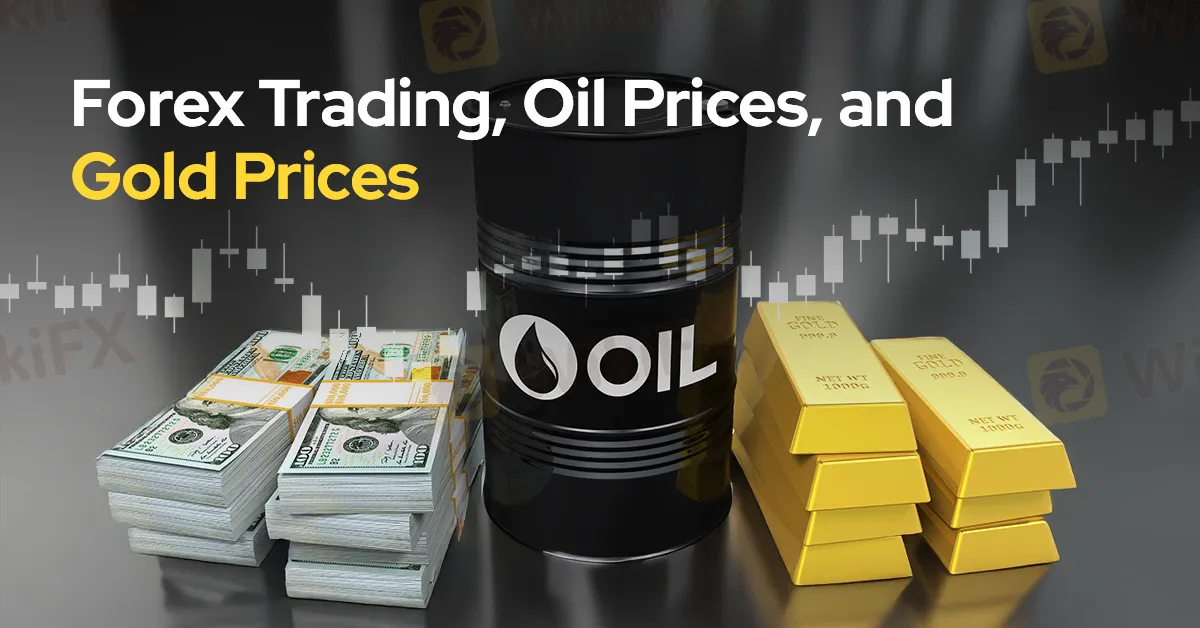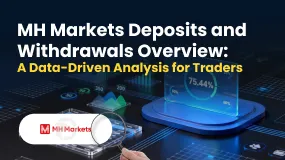简体中文
繁體中文
English
Pусский
日本語
ภาษาไทย
Tiếng Việt
Bahasa Indonesia
Español
हिन्दी
Filippiiniläinen
Français
Deutsch
Português
Türkçe
한국어
العربية
Forex Trading, Oil Prices, and Gold Prices
Abstract:Movements in one sector often ripple through others. This dynamic is especially true in forex trading, where fluctuations heavily influence currency values in commodity markets, particularly oil and gold.

Introduction
In the interconnected world of financial markets, movements in one sector often ripple through others. This dynamic is especially true in forex trading, where fluctuations heavily influence currency values in commodity markets, particularly oil and gold. Understanding the relationship between forex trading, oil prices, and gold prices is essential for traders seeking to anticipate market movements and adjust their strategies accordingly. This article will explore how these three factors are interrelated and how traders can use this knowledge to make informed decisions.
1. Oil Prices and Forex Trading: A Key Connection
Oil is often referred to as the lifeblood of the global economy. As one of the most heavily traded commodities, oil prices significantly impact currency values, especially for countries that are major producers or consumers of oil. Here's how the relationship works:
Oil Exporting Countries (Petrocurrencies)
Countries like Canada, Russia, and Saudi Arabia, which are major oil exporters, see their currencies tied closely to the price of oil. For example, the Canadian dollar (CAD) is often referred to as a “petrocurrency” because Canada's economy heavily relies on oil exports. When oil prices rise, oil-exporting countries experience a boost in revenue, which strengthens their currencies. Conversely, when oil prices fall, the currencies of these countries tend to weaken due to decreased export income.
Example: A rise in oil prices may lead to an appreciation of the Canadian dollar against the U.S. dollar (USD/CAD), as higher oil revenue increases demand for the CAD.
Oil Importing Countries
On the flip side, countries that are net oil importers, such as Japan and India, are negatively affected by rising oil prices. These countries spend more on energy imports when oil prices increase, leading to trade imbalances and potential depreciation of their currencies. Higher oil prices can also lead to inflationary pressures, which may cause central banks to adjust interest rates, further influencing currency values.
Example: A surge in oil prices can cause the Japanese yen (JPY) to weaken against the U.S. dollar (USD/JPY) as Japan imports most of its oil.
U.S. Dollar and Oil Prices
Since oil is globally traded in U.S. dollars, there is an inverse relationship between oil prices and the value of the dollar. When the U.S. dollar strengthens, oil becomes more expensive for buyers using other currencies, often leading to a decline in oil prices. Conversely, a weaker dollar makes oil cheaper for foreign buyers, potentially driving up demand and prices. This creates a cyclical relationship between oil and forex, particularly for oil-exporting and importing nations.
Example: A weakening U.S. dollar can cause oil prices to rise, impacting currencies like the CAD or RUB (Russian ruble).
2. Gold Prices and Forex Trading: A Historic Safe-Haven
Gold has long been considered a safe-haven asset, attracting investors during times of economic uncertainty, inflation, or currency devaluation. Its relationship with forex trading is multifaceted, as gold prices influence currency values, and currency movements can also affect the price of gold.
Gold and Inflation Hedging
Gold is commonly used as a hedge against inflation. When inflation rises, the value of fiat currencies tends to decrease, leading investors to seek safer assets like gold. For example, if inflation in the U.S. rises, the U.S. dollar may depreciate, prompting investors to buy gold, which drives up gold prices. Traders should watch for inflationary trends, as they often signal changes in both gold prices and forex markets.
Example: A sharp rise in inflation in the eurozone may weaken the euro (EUR), causing investors to flock to gold, push gold prices higher.
Gold and Currency Correlations
Similar to oil-exporting countries, gold-producing nations like Australia and South Africa have currencies that are highly correlated with gold prices. The Australian dollar (AUD), for example, tends to rise when gold prices increase because Australia is one of the worlds largest gold producers. Conversely, a decline in gold prices often leads to a depreciation of the AUD.
Example: An increase in gold prices may lead to an appreciation of the Australian dollar (AUD/USD), while a drop in gold prices could weaken it.
Safe-Haven Status of Gold
During periods of geopolitical tension or economic uncertainty, investors tend to flock to gold as a safe store of value. This rush toward gold can drive up its price, which in turn influences currencies like the U.S. dollar and Swiss franc (CHF). Safe-haven currencies like the CHF and JPY are also closely linked to golds movements. When gold prices rise, these currencies often strengthen as well.
Example: A geopolitical crisis in the Middle East may drive gold prices higher, leading to a strengthening of the Swiss franc (CHF) against the U.S. dollar (USD/CHF).
3. The Interaction Between Oil, Gold, and Forex Trading
While oil and gold have independent influences on forex trading, there are times when the two commodities interact and create broader market shifts:
Inflationary Pressures
Rising oil prices often lead to inflationary pressures as the cost of goods and services increases. This inflation can lead to currency depreciation, prompting investors to turn to gold as a hedge. For example, if oil prices spike due to supply disruptions, inflation could rise globally, causing both currency depreciation and increased demand for gold.
Example: A spike in oil prices due to OPEC production cuts could cause inflation to rise in major oil-importing countries, leading to depreciation of currencies like the JPY, while gold prices increase as a safe-haven asset.
Market Sentiment and Risk Appetite
Both oil and gold play significant roles in shaping market sentiment. When oil prices rise sharply, it can signal strong economic demand, encouraging risk-taking in the forex market. Conversely, rising gold prices often indicate risk aversion, as traders seek safe-haven assets during times of crisis. Forex traders need to be aware of these sentiment shifts, as they can quickly affect currency values.
Example: If oil prices rise due to increased global demand, traders may shift towards higher-risk currencies like the Australian dollar (AUD). If gold prices are also rising, it could indicate underlying uncertainty, leading traders to seek safe-haven currencies like the CHF or JPY.
The U.S. Dollar as a Mediator
The U.S. dollar plays a crucial role in the interaction between oil, gold, and forex. As the primary currency used in global oil transactions and the world's reserve currency, changes in the value of the dollar often ripple through commodity markets. When the dollar strengthens, both oil and gold prices tend to decline, which in turn affects forex trading strategies.
Example: A rising U.S. dollar may lower the price of gold and oil, weakening currencies like the AUD (gold-linked) and CAD (oil-linked).
Conclusion
The relationship among forex trading, oil prices, and gold prices is complex and intertwined. Oil prices influence the currencies of both exporting and importing nations, while gold serves as a hedge against inflation and a safe haven during times of crisis. Understanding these relationships is critical for forex traders looking to navigate market volatility and capitalize on global commodity movements. By staying informed about oil and gold price trends, forex traders can anticipate currency movements and adjust their strategies for greater success in a rapidly changing market.

Disclaimer:
The views in this article only represent the author's personal views, and do not constitute investment advice on this platform. This platform does not guarantee the accuracy, completeness and timeliness of the information in the article, and will not be liable for any loss caused by the use of or reliance on the information in the article.
Read more

Garanti BBVA Securities Exposed: Traders Report Unfair Charges & Poor Customer Service
Have you been financially ruined through chargebacks allowed by Garanti BBVA Securities? Do you have to wait for hours to get your queries resolved by the broker’s customer support official? Did the same scenario prevail when you contact the officials in-person? Failed to close your account as Garanti BBVA Securities officials remained unresponsive to your calls? Many have expressed similar concerns while sharing the Garanti BBVA Securities review online. In this article, we have shared some complaints against the broker. Take a look!

In-Depth Review of Stonefort Securities Withdrawals and Funding Methods – What Traders Should Really
For any experienced forex and CFD trader, the mechanics of moving capital are as critical as the trading strategy itself. The efficiency, security, and transparency of a broker's funding procedures form the bedrock of a trustworthy, long-term trading relationship. A broker can offer the tightest spreads and the most advanced platform, but if depositing funds is cumbersome or withdrawing profits is a battle, all other advantages become moot. This review provides a data-driven examination of Stonefort Securities withdrawals and funding methods. We will dissect the available information on payment options, processing times, associated costs, and the real-world user experience. Our analysis is anchored primarily in data from the global broker regulatory inquiry platform, WikiFX, supplemented by a critical look at publicly available information to provide a comprehensive and unbiased perspective for traders evaluating this broker.

MH Markets Deposits and Withdrawals Overview: A Data-Driven Analysis for Traders
For any experienced trader, the integrity of a broker is not just measured by its spreads or platform stability, but by the efficiency and reliability of its financial plumbing. The ability to deposit and, more importantly, withdraw capital without friction is a cornerstone of trust. This review provides an in-depth, data-driven analysis of the MH Markets deposits and withdrawals overview, examining the entire fund management lifecycle—from funding methods and processing speeds to fees and potential obstacles. MH Markets, operating for 5-10 years under the name Mohicans Markets (Ltd), has established a global footprint. With a WikiFX score of 7.08/10, it positions itself as a multi-asset broker offering a range of account types and access to the popular MetaTrader platforms. However, for a discerning trader, the real test lies in the details of its payment systems and the security of their funds. This article dissects the MH Markets funding methods withdrawal experience, leveraging pr

GAIN Capital Review: Exploring Complaints on Withdrawal Denials, Fake Return Promises & More
Is your forex trading experience with GAIN Capital full of financial scams? Does the broker disallow you from withdrawing your funds, including profits? Have you been scammed under the guise of higher return promises by an official? Does the GAIN Capital forex broker not have an effective customer support service for your trading queries? Concerned by this, many traders have shared negative GAIN Capital reviews online. In this article, we have discussed some of them. Read on!
WikiFX Broker
Latest News
GCash Rolls Out Virtual US Account to Cut Forex Fees for Filipinos
WikiFX's New Evaluation of ATM Capital LTD: Does its License Protect the Arab Investor?
How a Fake Moomoo Ad Led to the “New Dream Voyage 5” Scam
Is Axi Legit? A Data-Driven Analysis of Its Regulatory Standing and Trader Feedback
Trive Investigation: High Score, Hidden Risk - The Profit Paradox
In-Depth Uniglobe Markets Commission Fees and Spreads Analysis – What Traders Should Really Know
FXPesa Review: Are Traders Facing High Slippage, Fund Losses & Withdrawal Denials?
CMC Markets Australia Revenue Surges 34%, But High-Net-Worth Clients Face Tax Phishing Threat
The 350 Per Cent Promise That Cost Her RM604,000
INZO Commission Fees and Spreads Breakdown: A 2025 Data-Driven Analysis for Traders
Currency Calculator



